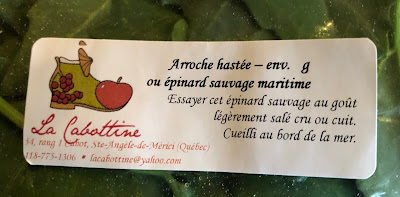A delicious wild-foraged vegetable found at the monthly farmer's market in Le Bic turns out to be
Atriplex prostrata (creeping saltbush, fat hen, halberd-leaved atriplex, or orach in English; in French, epinard sauvage or arroche hastée).
I'd spent time over the last week trying to make it into sea kale (
Crambe maritima), as the vendor had told me it was "sea spinach" and I thought it must be sea kale, which is similar in its habitat, but not really in its morphology, so I was skeptical about its identification, especially as the 15+ pg list of native and naturalized plants of Quebec that I'd printed out last summer, didn't include it, although it was historically grown here and there's increased interest in it now, as a perennial vegetable crop. I'd also seen it grown at Monticello, Old Salem, and in historic British vegetable gardens.
So I was delighted to visit the weekly farmer's market in Rimouski today and discover my mystery vegetable's true identity (it was a delicious vegetable, so I was motivated). Two vendors were selling it (along with
Salicornia, too, as last week's vendor was), although in much smaller packages. It was still pricey, though at $4.50 CA (roughly $3.40 US); we paid $10 CA for the bag last week.
It turned out to be an
Atriplex -- a large genus of both annual and perennial shrubs.
 |
| Identification solved! |
 |
| Not a large bag for $4.50 CA, but it was wild-foraged. |
So, knowing I'd seen quite a bit of Atriplex growing along a nearby beach, I headed over there this afternoon and collected this salad spinner amount of leaves in about ten minutes, collecting large leaves (easier to harvest), and thinking that cooked, they'd be perfect.
 |
| collected along a local beach |
 |
| description in a flora for coastal areas of Quebec and the Maritimes |
The taste test will be part of tonight's dinner. Small, younger leaves vs. the larger ones. There's a lot more plant geek information that I gleaned along the way about this plant and its distribution, whether it's native or not (not clear), but this species is clearly a ruderal plant that thrives along coasts around the world.




Comments
Post a Comment
I enjoy hearing from fellow nature lovers and gardeners. Let me know your thoughts.